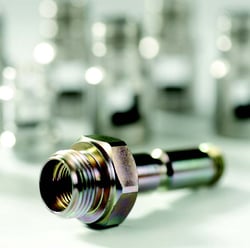Water-Based or Solvent-Based Parts Washing
Which system is the best fit at your facility?
If your company does machining or forming, your machine tools are using oil and/or water based cutting lubricants. The use of oil lubricants are most commonly used when operating single and multi-spindle screw machines, Swiss lathes, transfer machines, close tolerance sizing machines, cold heading, stamping and bending. Water based coolants are commonly used on conventional lathes, machining centers and grinders. If your shop is like many, it is not uncommon to have a mixed bag of both oil or water based lubricants.
Just like oil or water are your two choices in machining or forming lubricants, there are also two choices in part washing fluids. One is solvent based and the other is water based. So how does one choose? First, it is wise to understand nothing works better in removing oil soils than a solvent. If 100% or a high percentage of your work is oil based, you should clearly steer toward a solvent based system. If 100% of your work is done in water based coolant, water based cleaning may be your best choice, but not in all cases.
 The key to a successful ROI for a new washer means limiting or completely eliminating your reoccurring costs. If you are using or considering a water based washer your high ranking reoccurring costs will include; cost (or availability) of water, cost to condition hard water, cost of washing consumables, labor costs in time to monitor, mix or change chemistry, energy costs, chemistry separation and disposal costs.
The key to a successful ROI for a new washer means limiting or completely eliminating your reoccurring costs. If you are using or considering a water based washer your high ranking reoccurring costs will include; cost (or availability) of water, cost to condition hard water, cost of washing consumables, labor costs in time to monitor, mix or change chemistry, energy costs, chemistry separation and disposal costs.
If you are using or considering the use of a solvent based washer your likely choice will be one of two systems. The first is a conventional open air vapor degreaser. Open atmosphere vapor degreases are commonly found at facilities removing oil soils. The biggest problem associated with vapor degreasers is the solvents used in the system. Depending on your state, many are considered hazardous.  They have either been entirely banned or are on the EPA hit list. This leaves users, or potential users, stuck in having to use prohibitively expensive solvent alternatives. Your second choice in solvent washing is referred to as a “vacuum chamber technology” where parts are washed and dried in a single chamber under vacuum from start to finish. The systems are built in many different sizes based on part size and production volumes. Although these washers can use various solvents, the most popular choice is a solvent referred to as Modified Alcohol. One such Modified Alcohol, known as Metalnox 6386, is manufactured by Kyzen, a Nashville based cleaning chemistry corporation. This non-hazardous, biodegradable, organic solvent is RoHS compliant, CFC free (chlorofluorocarbon free), Halogen free, non-flammable and Reach compliant. Modified Alcohol also has the benefit of having both polar and non-polar properties, which, unlike other solvents, makes it suitable for cleaning both oil and water based coolant soils.
They have either been entirely banned or are on the EPA hit list. This leaves users, or potential users, stuck in having to use prohibitively expensive solvent alternatives. Your second choice in solvent washing is referred to as a “vacuum chamber technology” where parts are washed and dried in a single chamber under vacuum from start to finish. The systems are built in many different sizes based on part size and production volumes. Although these washers can use various solvents, the most popular choice is a solvent referred to as Modified Alcohol. One such Modified Alcohol, known as Metalnox 6386, is manufactured by Kyzen, a Nashville based cleaning chemistry corporation. This non-hazardous, biodegradable, organic solvent is RoHS compliant, CFC free (chlorofluorocarbon free), Halogen free, non-flammable and Reach compliant. Modified Alcohol also has the benefit of having both polar and non-polar properties, which, unlike other solvents, makes it suitable for cleaning both oil and water based coolant soils.
Choosing the right washer goes far beyond deciding between water based or solvent based technology. Your part size, part geometry challenges and production requirements are equally important to a successful result. Is a Gosiger washing solution your best choice and will our systems work for you? Either way, you can depend on our extensive machining and washing experience to steer you in the right direction.
